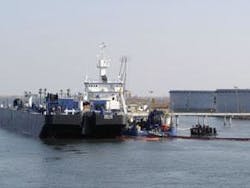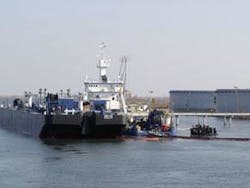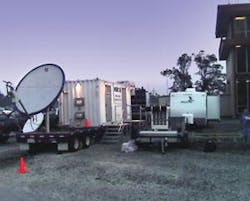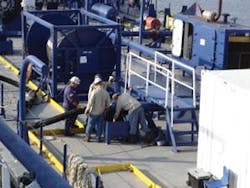MSRC helps oil companies handle destructive hurricanes
The Marine Spill Response Corp. (MSRC), which moved massive volumes of equipment to help oil and gas producers and pipeline companies restore operations after two 100-year storms ripped through the Gulf Coast last year, is preparing for a repeat performance. The industry-funded organization says it can handle what the US National Hurricane Center expects to be 20-25 years of extremely strong and damaging storms.
MSRC said it has resources to deal with problems worse than Hurricanes Katrina and Rita.
“We are certainly prepared for similar situations if they occur in the future or even expanded situations,” MSRC President and Chief Executive Steve Benz said. The organization is making sure it has enough equipment and that its equipment performs at “optimal” levels.
MSRC, prompted by the 1989 Exxon Valdez oil spill off Alaska, is an independent, nonprofit organization created in 1990 to assist the petroleum and energy-related industries with problems resulting from oil spills on water. The petroleum industry funds it through the Marine Preservation Association (MPA).
Since its inception, MSRC has broadened its scope of services to include nonspill emergencies such as hurricanes, floods, fires, and other disasters and its range of operations to all areas off the continental US, Hawaii, and the Caribbean. It provides this capability from regional response centers in Edison, NJ.; Houma, La. (previously in Lake Charles, La.); Concord, Calif.; and Everett, Wash.
Ivan’s lesson
MSRC had its first chance to deal with a real storm in September 2004, when Hurricane Ivan destroyed 7 offshore platforms, damaged 24 others, and wrecked segments of 102 pipelines, causing what was at the time the biggest storm-related production curtailment in the Gulf Coast’s history (OGJ, Sept. 5, 2005, p. 24). The storm tested MSRC’s nonspill responses, including communications and transportation.
Ivan, MSRC said, focused attention on the importance of backup plans. If resources must be moved from Location A to Location B in an emergency, MSRC still needs to be able to respond if Location A also develops an emergency.
This lesson proved essential during the double punch of Hurricanes Katrina and Rita in 2005. Among the equipment MSRC moved to the devastated region was the oil spill response vessel (OSRV) Virginia, which left Virginia Beach, Va., for the Gulf Coast, leaving a vacancy that MSRC would have had to fill if Hurricane Wilma, which followed Rita, had threatened the Atlantic Coast.
“At no point did we feel we didn’t have enough equipment or couldn’t bring more to bear and yet still meet backup plans elsewhere,” Benz said. “It might have been an interesting challenge had Wilma presented problems for us.”
Wilma, which took a route off Florida, created little activity for MSRC.
Unprecedented response
During Hurricanes Katrina and Rita, MSRC provided MPA members with cleanup, transportation, communications, and other services.
As Katrina approached in the gulf, MSRC received an unprecedented 17 requests from MPA members for response equipment such as marine vessels and mobile communications units.
“Companies were reserving equipment in advance,” Benz said. And as hurricane warnings became more ominous, additional companies requested equipment but found it was already reserved. At that point, MSRC offered alternatives to the requested equipment.
The overall Katrina-Rita response was the largest such effort in MSRC’s history. All of its major floating response assets in the Gulf Coast region were deployed as well as additional equipment from MSRC’s other US operations.
The organization also deployed five mobile communications suites and seven OSRVs. MSRC cannot recall needing even two of the 210 ft, $13 million responder class vessels simultaneously until last year, when four were used during Hurricane Ivan’s response effort.
Despite massive equipment relocations to the gulf, MSRC had full capability in each of its other US ports to assist other MPA members if that had become necessary.
Restoring operations
To help oil and gas companies restore operations, MSRC established an operations command center, consisting of management, logistics, human resources, and safety planning personnel, in Lake Charles, La. As Hurricane Rita approached, the Lake Charles operations were moved 100 miles north to Many, La., for safety. MSRC maintained communications with its various vessels and the command center, despite power failures.
MSRC also helped prevent delays in subsequent oil tanker deliveries to refineries. It coordinated with the US Coast Guard to establish a plan for alternate resources to ensure that oil transfers were not hindered.
In Pascagoula, Miss., MSRC provided telecommunication support that enabled pipeline operations to resume on the 1.2 bcfd Destin gas pipeline operated by BP PLC for itself and Shell Gas Transmission (OGJ, May 12, 2003, p. 58).
MSRC used its mobile communications suite to provide five telephone stations and a fax line to the pipeline company’s offices. Internet access was also provided via satellite.
In Grand Isle, La., MSRC helped an oil and gas company restart oil production by reestablishing communications to each hurricane-battered platform owned by the company, which was not identified.
MSRC used one of its mobile communications suites to restore the communications by relaying dial tones via microwaves. The communications suite, MSRC said, consisted of an internet satellite system that enabled access to the oil and gas company’s corporate network; 20 telephone stations, 15 of which were going across the company’s microwave system to four platforms and a barge in the gulf; and 20 handheld radios, which were reprogrammed to the company’s frequencies for use by its personnel.
It is necessary in an emergency to have ingenuity. When a 5,000-ton weight limit was imposed on the bridge connecting Port Fourchon and Grand Isle because of damage from Katrina, MSRC used a barge to move a mobile communications suite, generator, satellite ground mount, and support equipment to Grand Isle, where it set up a ground-based mobile communications suite.
Meanwhile, in Pilottown, La., Katrina had moved six oil storage tanks off their foundations and damaged several others, creating leaks. To prevent further environmental damage, MSRC deployed an OSRV and two barges for use as a recovery and containment site for oil that had been spilled or was in possibly weakened tanks. The barges were then offloaded at other facilities.
To keep crude flowing to the Midwest on the vital St. James Capline, MSRC provided a mobile communications suite with a satellite system and internet access satellite, 19 telephone extensions, and three fax lines to an oil and gas company’s offices. MSRC technicians worked on two of the company’s telephone switches and installed a radio system with 12 handheld units.
In addition, MSRC acquired and coordinated the installation of a microwave system to provide additional telephone and data service to another facility at St. James.
MSRC helped a Nairn, La., company in a remote area, by providing logistics as well as oil cleanup and recovery efforts for a damaged pipeline.
The company had to fix a broken levee before repairing the pipeline. MSRC provided telephone, fax, and radio support for the cleanup vessels via portable kits with communications suites.
In a remote area known as Wagon Wheel southwest of Venice, La., MSRC provided an oil and gas company with logistical support to recover oil from a blowout. Due to a lack of infrastructure in the marshland area, an OSRV could not be used. Instead, MSRC deployed smaller skimming vessels to clean up the site, allowing operations to resume.
MSRC remained on standby to assist with further response, if necessary, and also provided the company with communication capabilities and medical facilities.
At Port Fourchon, MSRC simultaneously supported two companies via one mobile communications suite. The suite, equipped with a satellite system, provided 14 stations and two fax lines for one oil and gas company and four stations and one fax line for another.
In addition, MSRC provided radio dispatch and phone patches to the two companies’ rigs and vessels from their offices in Houston and Morgan City.
MSRC also installed a high-gain antenna system to allow one of the companies to increase its radio coverage.
Personnel challenges
Because the homes of many MSRC employees also suffered storm damage, the organization faced several unique relief-effort challenges of its own.
Its loss of available workers was extensive as employees from Pascagoula, Miss., to Plaquemines Parish, La., took administrative leave to tend to family matters.
MSRC provided nine trailers for displaced families to use as temporary living quarters. The company said it brought in an entire replacement team to staff the Lake Charles Response Center, which was destroyed. The center, headquarters for MSRC’s southern region branch, was moved to Houma.
To accommodate response workers, MSRC converted large OSRVs into “floating hotels,” each of which could house 38-40 people. Initially, many employees at remote locations having no power slept in automobiles and went without hot showers and laundry for as long as 2 weeks.
A new challenge, MSRC said, was the need to provide additional security after Katrina to ensure that supplies reached intended destinations without intervention from looters.
These challenges did not strain MSRC’s response capability.
“We have drills for situations like this,” said Benz. MSRC conducts more than 200 drills/year.
The organization also utilized its Spill Team Area Responders, a network of contractors set up to reinforce MSRC’s 400 professionals.
It used an additional 150 navigation crew workers-contract employees who transport the spill response equipment to specified locations.
Overall, about 190 employees worked on the Katrina-Rita recovery efforts because of the need to rotate personnel during the lengthy relief effort, MSRC said.
Although facing unprecedented circumstances, MSRC employees were able to extend themselves beyond their normal response duties.
Rick Tyrrell, telecommunications and information systems manager, restored communications to the Cypress Bend Hotel in Many, La., by providing power to the hotel’s private telephone network. This allowed the Federal Emergency Management Agency to communicate via e-mail and complete paperwork. He also set up a generator for the hotel’s kitchen.
At MSRC’s facilities in Houma, volunteers from Wildlife Rehab Education Inc., an organization that cleans birds after oil spills along the US coasts, used the facilities to clean rescued dogs and cats and even an oily 51⁄2 ft alligator.
Strengthening MSRC
Although the US has not had spills as large as that of the Exxon Valdez since the enactment of the Oil Pollution Act of 1990, MSRC said, the industry remains “very focused” on prevention and is committed to preparedness beyond required compliance. It said its members continue to provide funding in excess of regulatory requirements.
As part of its preparedness strategy, MSRC has combined forces with smaller oil spill response organizations (OSROs). It said the merging of OSROs strengthens a region’s resources and makes the response effort more efficient.
In April 2005, MSRC merged with Clean Sound Cooperative Inc. in the Puget Sound area, adding to its Pacific Northwest resources. And in July 2004, MSRC merged with Clean Coastal Waters Inc., a southern California industry-funded cooperative. This followed the merger in January of the same year with Clean Bay in northern California.
Currently, MSRC continues to support hurricane relief efforts in the gulf while simultaneously preparing to face the potentially severe challenges of this year’s upcoming storm season. ✦



